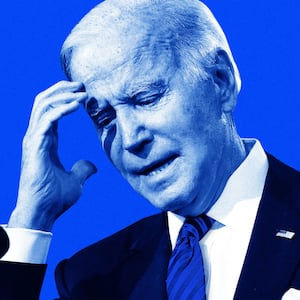In 2020, young voters helped propel Joe Biden to the White House, believing the oldest person ever elected to the presidency could usher in a new era of action on issues important to them.
Four years later, however, there are flashing warning signs that those same voters could help boot Biden from the White House.
Less than a year out from the 2024 election, polls show the president neck-and-neck with Donald Trump in the eyes of young voters, with Biden’s biggest slippage coming among young Black and Latino voters. It’s a huge departure from 2020, when voters under 30 favored Biden over Trump by a 26-point margin.
There’s a multitude of factors that could explain the trend, from young Americans’ attitudes on Biden’s handling of everything from climate change to student debt.
But the most potent factor souring young voters’ relationship with Biden at the moment may be the brutal Israel-Hamas war, which has galvanized a new generation toward the cause of the Palestinians and against leaders like Biden who have unequivocally backed Israel.
Democrats stress it is hard to determine just how much Biden’s position on the war has harmed his image among young voters—or if it will even be a problem at all come next November.
At the very least, it seems Biden has angered a not insignificant portion of the next generation of the Democratic Party base, one that came of age in the Trump era and is accustomed to outspoken activism on issues like police brutality.
Young organizers say they have seen a remarkable outburst of protest against U.S. policy on Israel since Hamas’ Oct. 7 terrorist attack sparked the war in Gaza.
Moné Holder, a senior director at Florida Rising, a voting rights and organizing nonprofit group, told The Daily Beast that young Black voters she’s spoken with since the war began have grown increasingly frustrated with the Biden administration.
“There’s nothing that I can think of to this magnitude besides maybe the killing of George Floyd and that era of the pandemic,” said Holder.
Despite its successful efforts at getting humanitarian aid into the Gaza strip and its apparently private pressuring of the Israeli government, the administration is getting heat for not calling for a ceasefire in Gaza and more forcefully decrying the immense civilian toll of Israel’s bombing campaign.
According to some polls, Biden is still in relatively good shape among Democrats when it comes to Israel: 62 percent of Democrats approve of his handling of the conflict in a recent YouGov poll)" href="https://urldefense.com/v3/__https://today.yougov.com/topics/travel/survey-results/daily/2023/11/09/49efe/2__;!!LsXw!QKZgLjkl9UBh9BSzuOHx2sCOJIwlvu1fH1VWO_xHGHLW-yoFiXxQD-VHmMDFEXoqToTf8-kTf4Ce5yuPs_rL8VY$">YouGov poll, with the strongest support coming from voters 18 to 29 years old. However, other surveys have shown heavy blowback to Biden’s approach to the war, with 57 percent of voters under 45 saying they disapproved of the president’s response, compared to just 41 percent in favor in an NPR-Marist poll this week.
For decades, fully backing the Israeli government has been one of the few enduring bipartisan areas of agreement in Washington. But members of the Millennial generation are now evenly split in Gallup’s tracking poll on American sympathies between the Israelis and Palestinians.
The twentysomething voters of Gen Z, meanwhile, have the unique perspective of only knowing a post-9/11 world and a country mired in open-ended war overseas until Biden withdrew troops from Afghanistan in 2021.
“For a lot of folks, for their entire life, we’ve been at war in the Middle East and involved in these kind of actions,” said Brian Tabatabai, the Democratic vice mayor of the large southern California suburb of West Covina and a high school teacher.
With roughly 8 million more Gen-Z voters aging into the electorate in 2024—and voting in increasingly large numbers—the stakes couldn’t be higher for how Biden’s moves on Israel are perceived among young voters.
If he is to win a second term in a closely divided and hyper-polarized country, the president can’t afford to bleed much support from a demographic that overwhelmingly backed him in 2020.
With little more than a half dozen states set to decide the 2024 presidential election, young voters may not be the deciding factor, but they will play a crucial role in the battleground states.
As both 2016 and 2020 showed, despite popular vote margins favoring Democrats in the millions, merely tens of thousands of votes can decide the winner in the Electoral College. And while voters under 30 may only comprise around a fifth of the national electorate, that share is only growing.
The Biden campaign did not return a request for comment for this story.
While there are troubling data points, some Democratic pollsters stress that this far out from an election, public opinion surveys are only so useful, especially among today’s 18 to 29-year-olds.
“How many people do you know who have a landline phone?” said Danielle Deiseroth, the executive director of the left-leaning think tank and polling shop Data For Progress. Deiseroth pointed to non-response bias—essentially who doesn’t respond, or isn’t able to respond—as another factor that can warp samples of young voters.
It’s also hard to parse from polls whether the dissatisfaction among young voters means they will vote for someone else or merely sit out an election, longtime Florida pollster Brad Coker said. This is a relevant question for Biden, given the low chances young voters would prefer Trump’s stance on Israel.
“There are some difficulties, and pollsters have tried to address it with polling on social media, but I generally don’t take the polling on young voters too seriously this far out from an election,” Coker told The Daily Beast.
Although the polling only goes so far as a useful metric, if Democrats had a major crisis on their hands with young voters, “it probably would have shown up in the results last week,” Coker added, alluding to major wins for the party in elections in Ohio, Kentucky, and Virginia.
Clouding much of the discourse among Democratic operatives is an internet landscape where it’s harder than ever to gauge what’s popular online.
In the new age of social media dominated by algorithms—particularly with the shift from curating one’s own feed to the limitless scroll pioneered by TikTok, which shows users videos they’re likely to keep watching regardless of which accounts they follow—some young voters are bombarded with videos of death and destruction from Gaza, while others hardly see any Israel-Palestine content.
On TikTok, prominent influencers who supported Biden in 2020 and even campaigned for him or attended events at the White House have turned on the president over Gaza, while other high-profile accounts are calling for Gen Z to sit out the 2024 election entirely.
“I’m seeing people ask, ‘What’s your plan? …I’m not showing up,” said Moschinodorito, a popular leftist account with more than 1 million followers. “Me and a bunch of people are not showing up. We’re not interested… Most people have felt this way since 2016, we’ve just been humoring you since.”
A common message the influencers keep hammering home is whether the “lesser of two evils” argument is enough to persuade them to back Biden again in a rematch against Trump.
“When we start talking about the lesser of two evils, a lot of my followers—all 3 million of them—are literally asking the question, like, ‘Damn, so the lesser of the two evils is the one that is supporting genocide?” The Conscious Lee, an account with more than 3 million followers who was invited to a State of the Union party at the White House last year, recently told Rolling Stone. “Noted, noted, noted.’”
Both these TikTok influencers did not respond to inquiries from The Daily Beast.
Deiseroth said the Biden White House can’t afford to totally block out the noise on TikTok, even if “there are a lot of really loud voices” leading the most extreme anti-Biden rhetoric. If 18 to 29-year-olds have “heard about the Biden administration at all” on Gaza or other elements of the White House’s agenda, she added, “they heard about it first on TikTok.”
Even nicknames, normally one of Biden’s strong suits, have begun to be turned against him by denizens of young people online.
Videos under the hashtag “Genocide Joe” racked up more than 8.3 million views on TikTok as of Wednesday, five weeks into the conflict—a far cry from the more favorable monikers of “Amtrak Joe,” “Scranton Joe,” or “Union Joe.”
For other segments of young voters, the Gaza war is not top of mind. But that doesn’t mean Biden doesn’t have work to do with them on other issues.
Out of all the door-to-door interactions Cynthia Wallace oversaw through Election Day in North Carolina as the co-founder of The New Rural Project, Israel only came up once after the Oct. 7 attacks. Otherwise, “I haven’t heard those issues come up, to be frank,” Wallace said.
Instead, “housing and prices” are the top concerns among voters Wallace is trying to register on the rolls, and there simply haven’t been “a lot of the international issues weighing on our voters.”
Tabatabai, the Californian vice mayor, who is also running for state assembly, teaches high school in a community where many students are first or second-generation immigrants.
He said his current and former students, along with Latino youth he hears from in the area in Los Angeles County, don’t necessarily pin the death and suffering in Gaza on Biden specifically. However, they also have a general weariness of the U.S. military and the nation’s overall security apparatus, particularly among students whose families recently immigrated to the country.
These kids, Tabatabai said, have a different relationship to the duties of citizenship than prior ones he’s encountered. He pointed to the summer of 2020, the recent rise in unionization across economic sectors and the reaction to the Israel-Gaza war among Gen Z as part of the same dynamic.
As an educator, Tabatabai said this is hardly an accident.
“We raised a generation to not just sit back,” he said.









